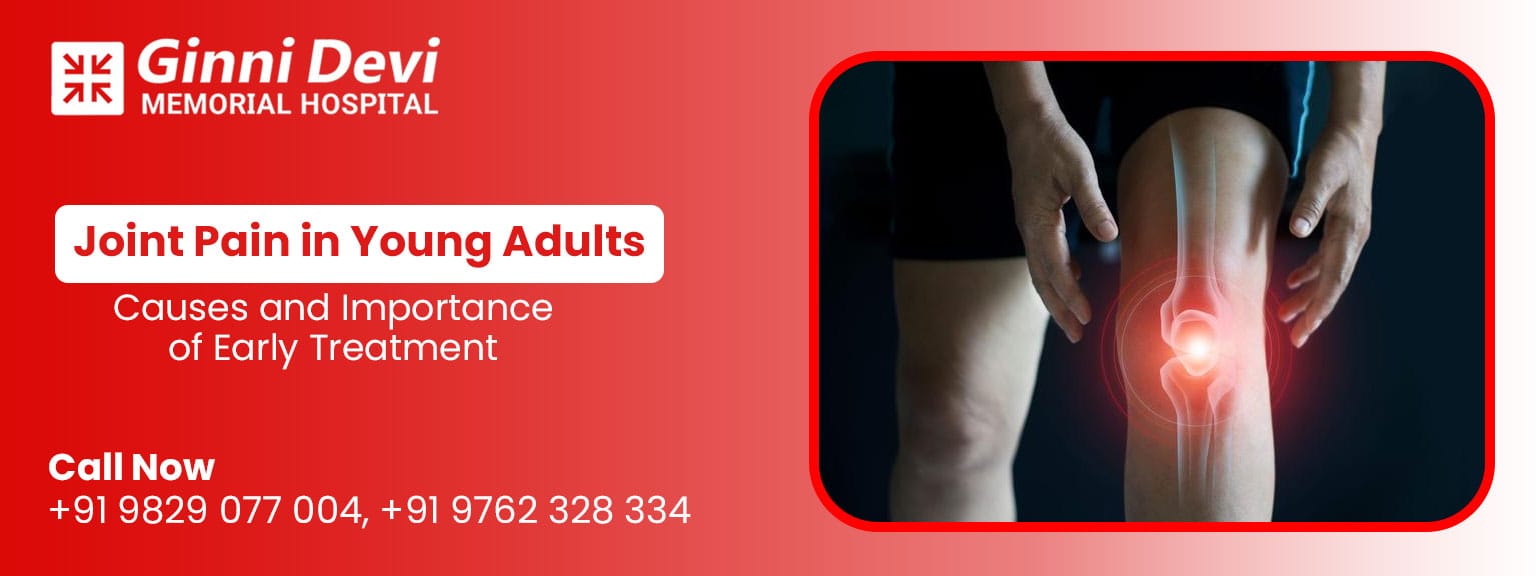Introduction:
Joint pain is often associated with ageing, yet an increasing number of young adults are facing the challenge of persistent joint discomfort. The assumption that joint pain is an issue exclusive to older individuals can lead to the neglect of early symptoms, especially among young adults. This oversight can have serious consequences, as untreated joint problems may progress, affecting mobility, daily activities, and overall quality of life. Understanding the causes of joint pain in young adults and the importance of early treatment is essential for maintaining long-term joint health.
If you or someone you know is experiencing joint pain, it is crucial to consult a Joint Replacement Surgeon in Jaipur for proper diagnosis and treatment. In some cases, early intervention may prevent the need for surgical procedures down the line, while in others, timely surgery can restore function and alleviate pain.
Common Causes of Joint Pain in Young Adults:
While joint pain in young adults can be attributed to various factors, it is important to identify the underlying cause to ensure appropriate treatment. Some of the most common reasons for joint discomfort include:
1. Injury or Trauma
Accidents, sports injuries, or improper posture can result in joint injuries. These injuries can damage ligaments, tendons, or cartilage, leading to pain, swelling, and reduced range of motion. Young adults who engage in physically demanding activities, whether professionally or recreationally, are especially prone to joint injuries. Prompt medical attention and rehabilitation are key to preventing long-term complications.
2. Overuse or Repetitive Strain
Repetitive motion or overuse of certain joints, particularly in activities like sports, manual labour, or even desk jobs, can result in strain. The excessive use of joints without adequate rest can cause conditions such as tendinitis or bursitis, where the tendons or bursae (small fluid-filled sacs) become inflamed. These conditions can cause significant discomfort, often leading to chronic pain if not addressed early.
3. Obesity
Excessive weight puts undue pressure on the joints, particularly the knees, hips, and lower back. For young adults struggling with obesity, joint pain is often one of the first symptoms of the physical stress the body endures. Maintaining a healthy weight through proper diet and regular exercise is crucial in reducing the risk of joint-related issues.
4. Inflammatory Diseases
Autoimmune diseases such as rheumatoid arthritis and lupus can affect young adults, leading to joint inflammation and pain. These conditions are chronic and require long-term management. Early diagnosis through blood tests and imaging can help in controlling symptoms and preventing joint damage.
5. Degenerative Conditions
While osteoarthritis is commonly associated with older adults, it can also affect younger people, particularly those with a family history or previous joint injuries. This condition results in the gradual breakdown of cartilage, leading to pain and stiffness in the affected joints. Early intervention can help in managing the symptoms and slowing the progression of the disease.
6. Lack of Physical Activity
A sedentary lifestyle can lead to muscle weakness and joint stiffness, making young adults more prone to joint pain. Staying physically active, stretching, and strengthening muscles around the joints can significantly reduce the risk of developing joint problems.
7. Genetic Predisposition
Some individuals are genetically predisposed to joint-related issues, such as arthritis or joint deformities. If there is a family history of joint problems, it is essential to monitor any early signs of joint pain and seek medical advice.
Importance of Early Treatment for Joint Pain
Ignoring joint pain, especially in young adults, can lead to chronic problems that become difficult to treat. Early intervention can prevent joint damage, restore mobility, and improve the overall quality of life. Here are a few reasons why early treatment is essential:
1. Prevention of Long-Term Damage
Joint pain caused by inflammation or injury can lead to permanent joint damage if not addressed in time. Conditions like osteoarthritis or rheumatoid arthritis can progressively worsen, eroding cartilage and limiting joint function. Early treatment can help in controlling inflammation and protecting the joints from further deterioration.
2. Avoidance of Surgical Intervention
In many cases, early treatment can help avoid the need for surgery. Conservative treatments, such as physical therapy, medications, and lifestyle changes, can significantly reduce pain and improve joint function. However, if surgery is required, it is crucial to consult a specialist. For young adults requiring knee or hip replacement surgery, GDMH Hospital in Jaipur offers advanced treatment options under the expertise of the Best Knee Replacement Surgeon in Jaipur.
3. Improvement in Quality of Life
Chronic joint pain can severely affect an individual’s ability to perform daily activities, reducing their quality of life. Early diagnosis and treatment can help alleviate pain, improve mobility, and allow individuals to lead active, healthy lives.
4. Avoidance of Compensatory Injuries
When joint pain is not treated early, young adults may unknowingly compensate by shifting weight or adjusting posture to reduce discomfort. This compensation can result in additional strain on other joints, muscles, or the spine, leading to secondary injuries. Early treatment can prevent this domino effect of musculoskeletal problems.
5. Cost-Effectiveness
Delaying treatment for joint pain often leads to more complex and expensive interventions later on. Early treatment with conservative methods, such as physiotherapy or medication, can be more cost-effective and less invasive than surgery.
Treatment Options for Joint Pain
Treatment for joint pain in young adults depends on the underlying cause and the severity of the condition. It is essential to consult an experienced Hip Replacement Surgeon in Jaipur to determine the appropriate course of action. Here are some common treatment options:
1. Physical Therapy
Physical therapy is one of the most effective treatments for joint pain. Strengthening the muscles around the joints, improving flexibility, and correcting posture can reduce pain and prevent future problems. Customised exercise programs are tailored to the individual’s needs, ensuring a safe and gradual recovery.
2. Medication
Anti-inflammatory medications, such as NSAIDs (non-steroidal anti-inflammatory drugs), can help reduce pain and inflammation in the joints. In cases of autoimmune disorders, disease-modifying antirheumatic drugs (DMARDs) may be prescribed to control the underlying condition.
3. Lifestyle Modifications
For young adults, making certain lifestyle changes can significantly reduce joint pain. Weight management, regular exercise, and avoiding repetitive strain on the joints are crucial in preventing joint problems from worsening. Engaging in low-impact exercises like swimming, cycling, or yoga can strengthen the joints without putting excessive pressure on them.
4. Injections
Corticosteroid or hyaluronic acid injections may be recommended for individuals experiencing severe joint pain. These injections can provide relief by reducing inflammation or lubricating the joints, respectively.
5. Surgery
When conservative treatments fail to provide relief, surgery may be necessary. Procedures such as arthroscopy, joint replacement, or cartilage repair can restore joint function and alleviate pain. For individuals considering joint replacement surgery, GDMH Hospital in Jaipur is a leading center, known for its state-of-the-art facilities and a team of skilled surgeons, including the Best Knee Replacement Surgeon in Jaipur.
Why Choose GDMH Hospital in Jaipur for Joint Pain Treatment?
GDMH Orthopedic Hospital in Jaipur is a top destination for individuals seeking high-quality joint pain treatment and surgery. With a reputation for excellence in orthopedic care, the hospital provides comprehensive treatment plans tailored to each patient’s unique needs. Some of the reasons to choose GDMH Hospital include:
- Expertise in Joint Replacement Surgery: The hospital houses some of the best surgeons in the field, including the Best Knee Replacement Surgeon in Jaipur and the Hip Replacement Surgeon in Jaipur. These experts utilise advanced techniques to ensure successful outcomes.
- State-of-the-Art Facilities: As one of the leading Orthopedic Hospitals in Jaipur, GDMH offers cutting-edge technology and modern infrastructure, ensuring that patients receive the highest standard of care.
- Comprehensive Care: From diagnosis to post-operative rehabilitation, GDMH provides end-to-end care for joint pain patients. The hospital’s multidisciplinary team ensures that every aspect of the patient’s recovery is addressed.
- Patient-Centred Approach: The staff at GDMH Hospital is committed to providing personalised care that focuses on the patient’s comfort, recovery, and long-term health.
- Accredited as the Best Knee Replacement Hospital: GDMH Hospital is recognised as the Best Knee Replacement Hospital in Jaipur, offering specialised care for patients undergoing joint replacement surgery.
FAQ:
Q. What diseases can affect the joints?
A. Common diseases that affect the joints include osteoarthritis, rheumatoid arthritis, gout, lupus, and psoriatic arthritis. These conditions cause inflammation, pain, and degeneration of joint tissues.
Q. How can I keep my joints healthy?
A. To keep joints healthy, maintain a healthy weight, engage in regular low-impact exercises like swimming or cycling, practice good posture, and include joint-friendly nutrients like omega-3 fatty acids and calcium in your diet.
Q. What hormone deficiency causes joint pain?
A. Estrogen deficiency, particularly in post-menopausal women, can lead to joint pain as estrogen helps maintain bone density and joint health.
Q. Can immune deficiency cause joint pain?
A. Yes, immune deficiencies can cause joint pain. Conditions like lupus and rheumatoid arthritis, which involve immune system dysfunction, lead to inflammation and pain in the joints.
Q. What diseases cause joint pain and weakness?
A. Diseases such as rheumatoid arthritis, osteoarthritis, lupus, fibromyalgia, and polymyalgia rheumatica can cause joint pain and muscle weakness, affecting mobility and daily function.




